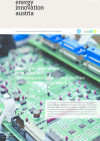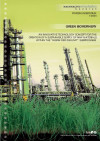Suchergebnisse für "Factsheet: Energietechnologien gestalten, die für alle sinnvoll und nutzbar sind"
Sustainable Business Planner
Further development of the established management concept business plan to the Sustainable Business Plan. Production, testing and dissemination of the holistic user-oriented IT Tool "Sustainable Business Planner" in the context of an Austrian start-up initiative.
digiactiv - digital transformation for more interactivity in MEP-(mechanical, electrical and plumbing-)planning
The aim of the digiactiv project was to improve the interoperability between the different stakeholders in the building construction sector using open and neutral semantic data models. With digital transformation processes, digiactiv helps to increase the quality of planning and the operation of buildings, as well as to minimize the interface risk between various stakeholders.
Conference: Smart Grids Week - Graz 2014
May 19th to 23rd, 2014
Energie Steiermark and CONGRESS GRAZGraz, AT
The Smart Grids Week - Graz 2014 aims to significantly contribute to the further development of electricity infrastructures and to link the Austrian Smart Grids activbities with the European initiatives.
Cooperative Refurbishment

Models for participation of owners and tenants in ecological refurbishment of multi floor buildings
VITALITY District - Optimized energy concepts in the early planning phase of resilient, energy-efficient neighbourhoods
The aim of the VITALITY District project is to coordinate the total (electrical and thermal) load and generation profile in the design phase of urban areas and neighbourhoods in order to optimize the energy concept of energy-efficient districts. Hence smart city indicators in detailed level (buildings, individual technologies, public spaces) as well as models, principles and catalogs of criteria for energy-optimized urban neighbourhoods are going to be created. The results are going to be presented in compact form on the district level in order to serve as input for future urban planning projects.
plusFacades - International know-how- and knowledge transfer of "intelligent Facade systems" for Austrian players and key personnel
The project proceeds from the idea that prefabricated intelligent facade systems represent a promising technology for the energy efficient refurbishment of buildings. A goal is to process the present international state-of-the-art and the existing know-how to this topic for Austrian experts.
Options for funding the "SMEs of the future" with Green Money
Creating all the necessary fundamentals for a future standard in funding the "SMEs of the future" with private equity in order to close the money gap of these companies by providing "green money".
Antistatic coatings for flooring by ionic liquids
Development of tailor-made ionic liquids as additive for coatings to prevent electrostatic loading in case of floors. The aim is to enhance the well-being in living areas to improve the quality of life and the quality of living.
IEA SHC Task 67: Compact Thermal Energy Storage Materials within Components within Systems
This Task aims to push forward the compact thermal energy storage (CTES) technology developments to accelerate their market introduction through the international collaboration of experts from materials research, components development and system integration. These technologies are based on the classes of phase change materials (PCM) and thermochemical materials (TCM). Materials from these classes will be studied, improved, characterized and tested in components.
Facade Integrated Solar Collectors

Within the framework of this project system-, structural- as well as building physical basis theories should be elaborated, which will serve as a basis for constructional and aesthetically attractive solutions for the production of facade integrated solar collectors without thermal separation. The recyclability of the materials used and resource efficiency play a central role when it comes to the development of constructional solutions.
Building planner of tomorrow

Practical courses "Integrated and sustainable planning of buildings. Results of the Austrian program - Building of Tomorrow". For architects, civil engineers, environmental engineers and other building professionals within masters programmes.
Smart grid innovations from Austria

New components and storage facilities for tomorrow‘s energy supply system.
energy innovation austria
2/2018
Herausgeber: BMVIT und Klima- und Energiefonds
Englisch, 8 Seiten
Downloads zur Publikation
Photovoltaic Power Systems - Cooperation within the scope of IEA
The "Photovoltaic Power Systems Programme" of the "International Energy Agency" (IEA) offers the world wide leading research platform in Photovoltaics. The Austrian participation at IEA PVPS is a important link to the international PV-society.
Development of an business segment called "Waldbiomasseversorgung-SÜDOST" through senior utilization of non active wood
A sharp increase in the Austrian industry's demand for wood, and in particular the rising need of biomass plant operators for energy wood, has led to a fundamental transformation of the timber market from a buyer's to a seller's market. New marketing opportunities in terms of a range of wood energy products, combined with an efficient way of harvesting, have opened up new economic prospects for the forestry industry.
Eco-textiles - from the eco-niche into the trend market!
Optimum communication strategies and motives for the purchase of eco-textiles by specific target groups are investigated. The results are reviewed with respect to the transferability to other branches of sustainable production and marketing. Aim of the project is to foster the supply of eco-textile products and thereby promoting the Austrian eco-textile producers and retailers.
Green Biorefinery

An innovative Technology Concept for the Creation of a Sustainable Supply of Raw Materials within the "Fabrik der Zukunft" Subprogram
Forschungsforum
1/2004
Herausgeber: BMVIT
Englisch, 6 Seiten
Downloads zur Publikation
KityVR - Artificial intelligence techniques to implement CityGML models and VR visualization
The goal of the project is to link 3D city models and virtual reality for energy-relevant applications as key-enabler for digital planning, construction and operational management. Missing data will be calculated using statistical enrichment methods.
Stanz+ - An innovative, energy-flexible plus-energy district - the centre of the village Stanz
Stanz+ is working on the implementation of an energy strategy for structurally weak municipalities with specific measures for revitalisation and re-densification in the building stock as well as the integration of renewable energy sources in the municipality of Stanz im Mürztal (Styria). The project includes multipliable approaches towards energy autonomy, hybrid use of energy networks for flexible usage and an energetic revitalisation of the village centre with the involvement of users in the "Rural Pioneers Community" for the usage of energy services.
Demonstration project senior-housing concepts for new construction and renewal in Vienna, Menzelgasse

Acompagning the process of realisation and settlement of two projects of senior-housing (new construction and renewal), documentation and general assumptions.
Sustainability Reporting - Guidelines for Sustainability Reporting based on reporting processes of VA Technologie and Österreichische Bundesforste
Scientific attendance of sustainability reporting processes in two partner enterprises (VA Tech and ÖBf AG). Development of the guideline "Reporting about Sustainability" based on these practical experiences.
